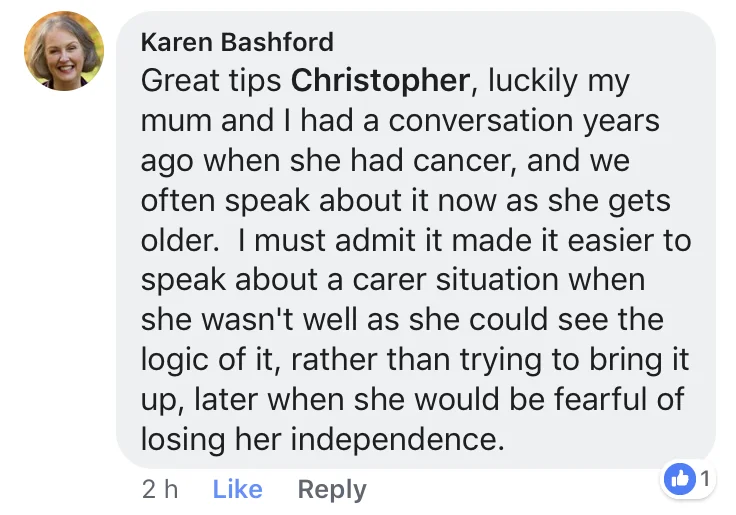1. Plan the conversation.
Think about when the best time to have the conversation would be. During Coronation Street is probably not going to be a good time. Perhaps it be a good idea to have the conversation in a quiet room or a cafe.
2. The conversation.
It's best to reassure your parents. There's some complex reasons why your parents probably don't want to have care. We talk about those on the guide, some interesting complex reasons.
There's likely to be fears around losing independence and dignity and as well as some other complex reasons.
Use empathy but most importantly of all. Listen and understand.
If you listen and understand to what they're thinking and feeling they are much more likely to come round to your way of thinking. Avoid arguments at all costs. They just won't come round to your way of thinking if there is an argument.
3. Conversation starters
Think about how to start the conversation. The start of the conversation is very, very important.
Try not to use a closed conversation starter like 'would you like to have a carer?'
They’ll say yes or no and that's it. End of conversation. Think of an open ended question
There are conversation starters which we've collated from lots of different websites on our guide.
Something like perhaps... 'What's worrying you?'
4. Support for yourself.
Could a GP be in on the conversation with you? Could you have the conversation in the GP's surgery. Perhaps a social worker could be with you or another professional. Is there a family member that could support you during the conversation? Have a think about support for yourself.
5. Take time.
Don't expect your parents to come round to your way of thinking 1st time. This is very unlikely to happen
It's probably going to take 3 or 4 conversations or more. Be patient and take your time.
6. Meet the carer.
Perhaps allow your parents to meet the carer or have a call with them before starting the care. Some companies allow you to do that.
And then perhaps also go 1 step further. Perhaps think about letting them meet the carer on their own or with you in a different room.
They may feel like they are more in control and they can start to develop a relationship with that carer. Sometimes works very well.
There's some extra bonus tips from our GP. Really interesting ones actually on the guide.
See you tomorrow for Wednesday's Dementia Live video and article.
Edit: One of our readers suggested talking about care early whilst they have their independence so they don’t feel they are losing independence, make it easier to think they are in control. Agreeing guidelines for when and how can be agreed taking the pressure off either side. See comment below…




